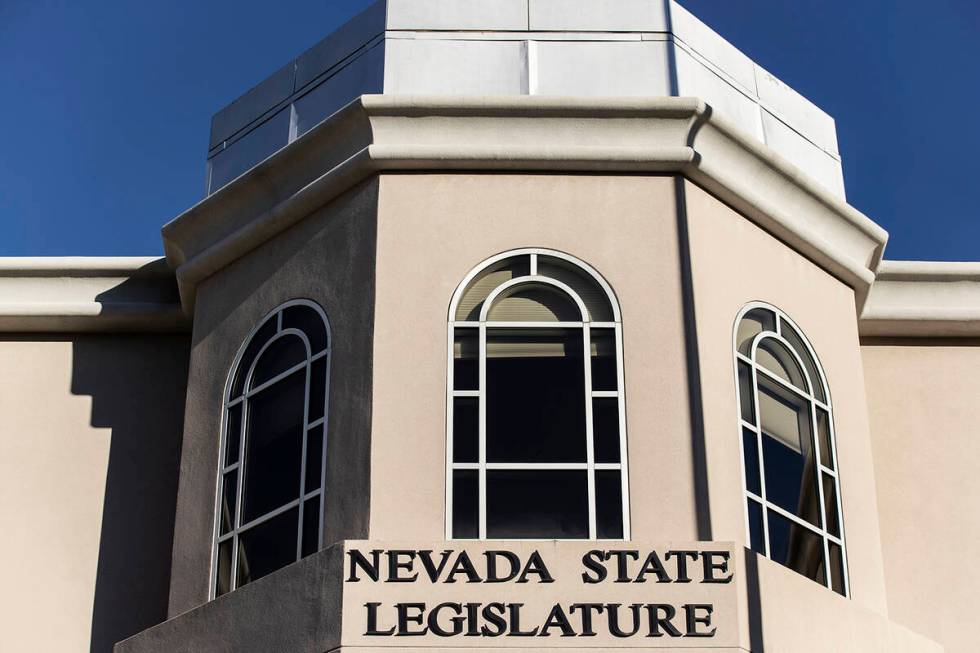Election bills advance as Legislature deadline approaches

CARSON CITY — The Nevada Legislature has taken the first step toward amending the state constitution to lend the state’s Electoral College votes to whomever wins the popular vote in presidential elections.
Assembly Joint Resolution 6, approved by the state Senate on Thursday, would add Nevada to the list of 15 states and the District of Columbia that have already signed on. The goal: Avoid a repeat of the elections of 2000 and 2016, in which the Democratic candidate who won the most popular votes still lost in the Electoral College.
The resolution — which passed on party-line votes in both the Assembly and Senate — must be approved again by the 2025 Legislature before voters get the final say in the 2026 general election.
Also on Thursday:
— The Assembly unanimously approved Senate Bill 406, which would make it a crime to threaten, harass or intimidate election workers with the intent to interfere with their work. The bill was also amended to prohibit the attorney general, state treasurer, secretary of state and controller from raising money before, during and after a legislative session. Previously, only members of the Legislature, the governor and lieutenant governor couldn’t raise money around sessions.
The bill was also approved unanimously by the Senate.
— The Senate unanimously OK’d Assembly Bill 73, which will allow high school students to wear traditional tribal regalia or “objects of religious or cultural significance” at graduation ceremonies. The Assembly also unanimously approved the measure last month.
— The Assembly gave bipartisan approval to a proposed constitutional amendment that would remove higher education regents from the constitution into state statute instead. The Assembly vote on Senate Joint Resolution 7 was 34-7, with several Republicans joining majority Democrats.
The measure will now appear on the 2024 ballot for voter approval. A similar measure was narrowly rejected by voters in 2020 by fewer than 4,000 votes out of more than 1.2 million cast.
Lawmakers also moved dozens of bills out of committee ahead of Friday’s second house passage deadline. Bills that haven’t been exempted or voted out of committee by the deadline will be declared dead.
— Lawmakers on the Senate Legislative Operations and Elections Committee voted unanimously to approve Assembly Bill 286, a bill to require county and city jails to ensure inmates are able to vote using electronic systems or mail ballots. People in jail have not been convicted of a crime and are awaiting trial, or are serving sentences for misdemeanors, so they have not lost their right to vote.
The committee also voted 3-2 to approve Assembly Joint Resolution 5, a measure that would amend the Nevada Constitution by repealing a provision which bars the state from operating a lottery or from selling lottery tickets. Republicans Heidi Seevers Gansert and Lisa Krasner, both of Reno, voted against approving the measure.
The resolution was passed on the Assembly floor in mid-April on a vote of 26-15. If passed in the Senate, the resolution would need to be passed in the next legislative session before being placed on the ballot for voters’ approval in 2026.
— Meanwhile, lawmakers on the Assembly Legislative Operations and Elections Committee voted 12-4 to approve Senate Bill 133, with Republican Assembly members Jill Dickman, R-Sparks; Brian Hibbetts, R-Las Vegas; Rich DeLong, R-Reno; and Richard McArthur, R-Las Vegas, voting no.
— Assembly Bill 220, legislation that would give the Southern Nevada Water Authority power to limit residential water use, was approved unanimously by lawmakers on the Senate Natural Resources Committee. It would cover most of the costs of residents switching from septic systems to municipal sewers, as well as limit residential water users to 0.5 acre feet per year during water shortage emergencies.
— Earlier Thursday, lawmakers on the Assembly Judiciary Committee voted unanimously to approve Senate Bill 129, a bill that would allow victims of sexual assault to bring a civil lawsuit against their attacker regardless of when the attack occurred.
— The Senate Judiciary Committee voted unanimously to advance Assembly Bill 356, a bill prohibiting the use of electronic tracking devices on vehicles, except for law enforcement agencies with a warrant. The bill comes after Reno Mayor Hillary Schieve found a tracking device planted on her car by a private investigator.
Contact Steve Sebelius at SSebelius@reviewjournal.com or 702-383-0253. Follow @SteveSebelius on Twitter. Contact Taylor R. Avery at TAvery@reviewjournal.com. Follow @travery98.